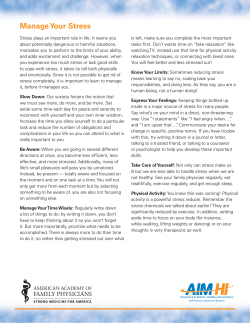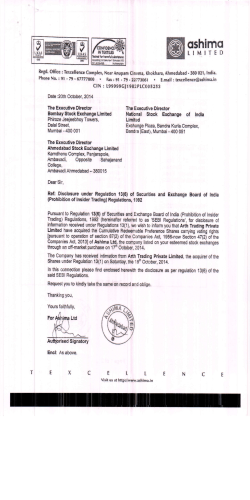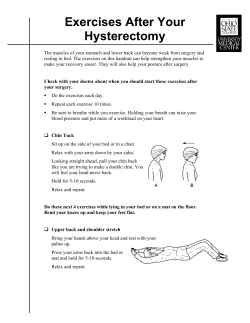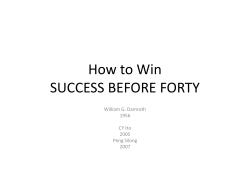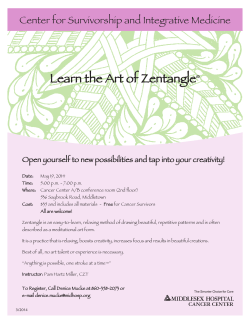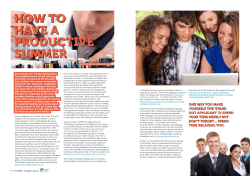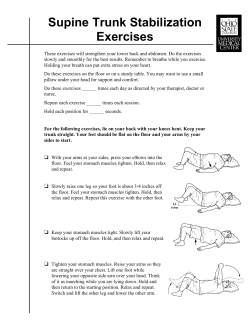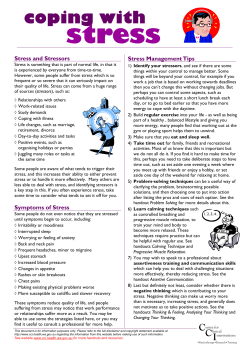
The Young & Restless: Women's Health Survey on Lack of Rest
\
.:
..,.4'1.1i€"
youn
Women's Health partnered with the daytime
syndicated talk show The Doctors to conduct an
exclusive survey that probed a problem
many modern women face-not getting enough
rest. Among the alarming discoveries:
We're now so perpetually "on" that our bodies
have forgotten how to relax, and that's driving us
toward a dangerous type of exhaustion.
BY XNISSY
168
BRADY PHOIOGNAPHS
BY CRAIG CUTTER
wiw-;"6
;;+#qiii
\ r'*''; ''
1
wr
\
'
-"'rd":+'
:
:
*+'
#
.L
,"b
ffi
&
#,..
#.
he
SS
For as long as Stephanie
Peterso tt,25, can
remembel she's lived in
overdrive. The founder
of a Colorado-based
company that supports
female entrepreneurs,
she's go-go-go
from
morningto night, week
to week ,yeal to year.
When she does get abreak,
she does what makes
her most comfortable:
She works some more.
Take her honeymoon to
Antigua: The plan called
for ztp-lining, beach
bumming, and candlelit
dinners. The reality was
Stephanie in her room on
her laptop, overlooking the
beach on which everyone
else was relaxing.
170
Things weren't much different
on a recent
trip with friends to
Steamboat Springs, Colorado. The
group had splurged on a chalet,
complete with glass elevator and
hot tubs. But as everyone lounged
around the living room, Stephanie
kept sneaking offto her room to
check e-mail. "There were a few
nights where Ijust stayed there and
didn't go back out," she says.
Some might call her aworkaholic,
but Stephanie contends that
high gear is simplyher normal
speed. She's way more content
being productive than sitting
around "doing nothing." And
she's certainlynot alone: Nearly
63 percent of the women in the
exclusive survey conducted by
Women's Health and The Doctors
said they rarely prioritize daily
k
%
downtime. What's more, women
spend less time on R&R than men
do, and awhopping 91 percent ofall
millenniais blowoffthe concept of
relaxation altogether, according to
Pew Research Center studies.
The trouble is, when chronically
being "on" becomes normal,Iulls
in activitybecome abnormal, even
uncomfortable, for the body and
mind. The idea of getting some rest
can, paradoxically, make women
feel restless. "So manywomen now
have a very diffi cult time stopping,
relaxing, and getting centered,"
says MelissaMcCreery, Ph.D., a
clinical psychologist and founder
of TooMuchOnHerPlate.com. And
that short-circuited capacity to
unwind comes at a surprisingly
unhealthy price-especially when
it goes unrecognized orunchecked.
The Growin€
Disquiet
The unwillingness-turnedinability to relax stems, in part,
from shifting ambitions. Some
15 years ago, around 25 percent of
women considered a high-paying
career extremely important;
today, 42 percent ofwomen do.
"But it's not necessariiy all about
the money," says Nicole Williams,
author of Glrl on Top: Your Guide
to Turning Dating Rules into Career
Success. Enter the 21st-century
concept of "having it all," which
feeds the mindset that every
moment you take to decompress
is a moment you could be using
to get ahead.
Add an unstable job market to
the mix, and women aren't just
striving for success, says Williams.
They're flghting for a competitive
edge, workingdouble time to
Iearn as much as they can as fast as
they can. This keep-up-or-else
mentality blurs the line between
personal and professional time,
upending the notion of work-life
balance, says Elisabeth Kelan,
Surviving Sans Rest
When relaxation avoidance goes extreme
Ph.D., author offilsrng Sfars. As
such, downtime is falling further by
the wayside, and those who are
pressingpause are often racked
with angst: Fifty-flve percent ofthe
women in our survey said theyfeel
guilty about taking time to relax.
:
::
:-
::-::::.::::.itillilll!
HAPPY HoUR?''
]1:,,'1,r,1;
NOTSOMUCHFOF
PEOPLEWHOHAUE
A HARDTIITE
UNWINDING.
Fueling restlessness even more
that women are rarely
unplugged. Some 83 percent
ofyoung adults have slept with
their cell phones, according to the
Pew Research Center, and, per
our survey,3O percent ofwomen
consider their smartphones
their lifelines. "Before smartphones
is the fact
and social media, you could only
compare yourselfto those around
you," says Larissa Faw, awriter
who covers millennial issues for
EPM Communications. "Now you
can see what the entire world
is doing in real time. making you
constantlyfeel as ifyou should
be
doingmore."
Being perpetually too busy
is also an iibercommon way to push
offtough life decisions, says
Toronto-based psychotherapist
Kimberly Moffit. "Women often
avoid relaxing because they're
subconsciously afraid that ifthey
do, they'll come face-to-face with
what's reallybothering them,"
she explains. In otherwords, not
having downtime equals not having
to deal. But this kind of emotional
evasion can be habit-forming,
ChillinS Out, On the Go
The new concept of "active rest" lets you quiet your body
and mind while still getting out and moving around.
It s*unds counterintuitive, bui relsxing doesn't have to be done off your feet.
Decompressing isn't frlways about stillness and silence (restless women'g
nenle.es). "Focusing orr one specific tesk and trlocking out intrusive, unsettling
thougl'its can induce a relaxation respense," says Kathy J. Helzlsouer, M.D.,
af the pr6vention and Rese*rch Center at rqercy Medical Center in Baltimore"
The Eoa! is to d3 one thing-and one thing anly*by yourself, says Susan
Ginsi:erg, of the Chicago-based Stop and Br€ethe program.
Loak for simlrle act;ons thet aren't taxing but still require yerur full attention.
Eesy bike ricles are ideal far active rest because you need to concentrate-but
not f6o hard-on pedaling, steering, and focusing on the road. Likewise,
painting your naiis requires a steedy hand anci uniform strokes. And hobbies like
knitting or drawing forc* you tc focus on rhythmic illo\iements and patterns.
Here's ths trick: You must chocse an activity that matches your current mood
and energy leveis. says Melissa McCreery, Ph.D. So, if you feel physically antsy,
go for a quiet nature lvalk. lf yaur mind is racing but you're tired. get lost in a
h*ok. lf your restlessness typically leads to something like stress eating, keep
yaur hands and rnind focused on a crossvvord puzzle.
in short, customize your active reSt to suit you, not the other way aroundatherr#ise, it rArcrn't work.
creatinghuge pileups of mental
tension, warns clinical psychologist
Elizabeth Lombardo, Ph.D., author
of A H ap py Yo u: Yo ur Ultimate
P re s cr ip tio n.fo r H ap p ine s s. The
result: a spin cycle ofcan't-sit-still,
can't-stop-now restlessness.
Broketr$Off"
Switch
a
Unlike Stephanie Peterson, Sharon
Rosenblatt, 25, does remember a
time when she felt less frantic.
l
A
"I used to totally relax," she says,
"and just sit in bed and watch
u
o
2
movies." Now, however, after a
fewyears at abusyI.T. consulting
job in Silver Spring Maryland,
Sharon fl nds herself scheduling
every minute of every day.
The handful of times shet tried
to really unwind were short-lived:
Asoak in the tub lasted only
minutes before restlessness
E
0
-
overcame her and she sprang up to
tackle her to-do list. A recent
massage was a relaxation disaster:
"The masseuse told me twice I
needed to stop talkingbecause
I was beginning to stress fter
out." she says. At night, her racing
mind keeps her awake, but
that's still preferable to totally
decompressing, which, she admits,
now seems even more daunting
than keeping so busy.
Restlessness like Sharon's flres
up the body's fight-or-flight stress
response, and it exists on a sliding
scale. Harnessing a moderate
amount of it can "actuallybe
valuable to help motivate you to
get ajob done and to do itwell,"
says Travis Stork, M.D., an ER
physician and cohost of ?he
Doctors. "But ifyou never take the
time to relax, you actuallylose
your abilityto do so at all." Staying
continuously restless means the
body never returns to a calm
baseline state-itt been rewired to
be all stress response, all the time.
That means the adrenal glands
are working 24-7, pumping out
the stress hormone cortisol,
consistentlyhigh levels of which
have beenlinked to abevyofwoes
such as indigestion and fatigue.
The longer you go without relaxing
the bleaker the picture becomes:
Anew studyfoundthat a major side
effect ofrestlessness is a reduction
in vigor. (Vigor is defined as a
combination of physical energy,
mental acuity, and emotional
well-being. Think of it as the polar
opposite ofburnout.)
'As theirvigor falls, people can
succumb to the detrimental eflects
of chronic cortisol overexposure,"
studyleader Shawn M. Talbott,
Ph.D., author of The Secret of
Vigor: How to Overcome Burnout,
Restore Metabolic Balance, and
says
N atural E ne rgy.
Those include heightened risks
for stress-related diseases like
thedoctorstv.com for more information,
afford yourselffewer than 15
minutes a dayto relax, you could
be edging toward restlessness,
says Lombardo. Other red flags:
restlessness can also lead to
irritable-bowel syndrome and
BEIiIG
RESTTESS
FIRES
UPTHE
BODYS
FlGllT-QR-
reduced sex driveWhat's more, in attemptingto
cope with chronic stress, women
become vulnerable to destructive
behaviors such as alcohol, drug,
or food abuse, says Amanda
Skowron, Psy.D., a clinical
psychologist at the Casey Health
Institute in Gaithersburg,
Maryland. Infact,somewomen
:*i.; :i5;:l"J:;:'#
Elrclr . _ ffi:::;t
RESP0I{SE, they just can't flgure out how to
effectively relax, says McCreery.
sorrS
AtL
STRESS- ReclaimingCalm
flt*rI'= n:itr;i**::il"ffin.
GoBig-But
CutYourself
GoHome
off
Use short
Avoid Ol..lT,
or "one
bursts cf
restlessness
t*
your advantage
when tack!ing
chal Ienges.
Yeur fight-or-
flight nesponse
can help you
get through
anything that
s€areg yoU
a little (a work
presentation,
asking out
a cute guy).
H6v/ever, adopt
the habit
erf
yourself ',vith
TUNE lN to the syndicated daytime
talk show The Doctors this October
(check local listings), when the hosts
and Women's Healfh wiil discuss
the results of their exclusive survey,
plus how you can overcome the rising
health threat of restlessness. Visit
cancels a dinner date-or if you
depression, anxiety, and
heart disease. Ifleft unchecked,
rer,:a rd in g
,*ffi#umrffi
only by accident-say, if someone
Re cl aim Yo ur
more thing"
syndrome, says
Kathy J.
Helzlsouer,
M.D. Trying to
squeez€ in that
last 0F,47
before bed can
lead ta big-time
rest less ness
An ace wey tc
manage
restlessness,
'r.rant
to ciig
youl, nails ir'lto
the chair, then
yeu're probably
nowhere near
ready for silent
meditation.
lnstead" buy
a mind-Lrody
relaxation
pi'of essiorla
says 5haYJft M.
ccnsider it
Ta!bOtt, Ph.D.
"But you need
to build in
accepta ble,
that's fine."
Spend some
breaks for
time chilling
recovery anci
rejuvenetlon."
out, then crcss
it off the list"
"if it neecls to
b* written
dolvn for ycu ta
guilty, stickwith it, says Stork.
"Remember, it's doctor's orders."
lf sitting still
makes you
sleeplessness).
lf you must
your f inal todo item, says
Helzls*uer.
strengthening," says McCreery.
You might not be graceful
at it at first, but even awkward
attempts to unwindwill
eventually segue into the real
thing. Get started with the flve
tips below. Ifthe process
makes you feel uncomfortable or
CountYour
Breaths
CD, sn rarhich
some R&R once
you reach your
Soal. "l'rn a
lruge advocate
of using stress
t{} motivate."
decompress. "Think of relaxation
as a muscle you're gradually
ListenUp
toShutUp
(not t0 mentian
lots af
p*wer through
a p.m. checklist,
merk down
unwi*dinE as
Like nearly 40 percent ofthe
women in our survey, you flll up
your rare free days with busy'r,vork
or non-crucial errands. Or, Iike
almost 30 percent of women,
you don't start unwindinguntil
day four of a vacation.
The good news is that just
about anyone can learn to
a
trained
!
talks you
through
a
guided
meditation
sessien. This
allow you
v+ill
to focus oR
something
other than
youf own
thoiJghis as yair
cjec6rfi press,
says Kristen
Eurris, an
acu pu
ncturist
and women'ghealth expert in
EaEie, ldahc.
Just
Admitlt
$ometimes
the ber6t
way to f isht
deep !:reathing
restl€$sness is
can also
to ackn0$JIcdSe
it's there, Whsil
y0u start feeling
f idEety, take a
moment to
recognize what's
going on, says
psychothcra flist
improv* ycur
sleep quaiity
end boost
your eilergy
levels, says
Susan 6insberg
of Stop and
Breathe.
Beg in ners
can try two-one
breathing, in
which you
exhale for twice
as long as you
inhele, for 1S
to 2O minutes.
To help with
stubborn sleep
problems, go
with S-16-32
breathing right
i:efore becl:
ei$ht long belly
breaths lyinE
on your back, l6
on your right
Karen R. Koenig.
L.C.S.W.
"Remember
that you don't
have to act on
the impulse te
move arouRCl,"
she says. "Yoir
ean even say
cut lourl:'l'm
fifte right now
just as l an1."'
Getting the
hang of baby
steps like
these wiii
encou rage
you to enact
sicle, and 32 on
he* Nthy
y0ur left.
changes.
I
t73
© Copyright 2026
